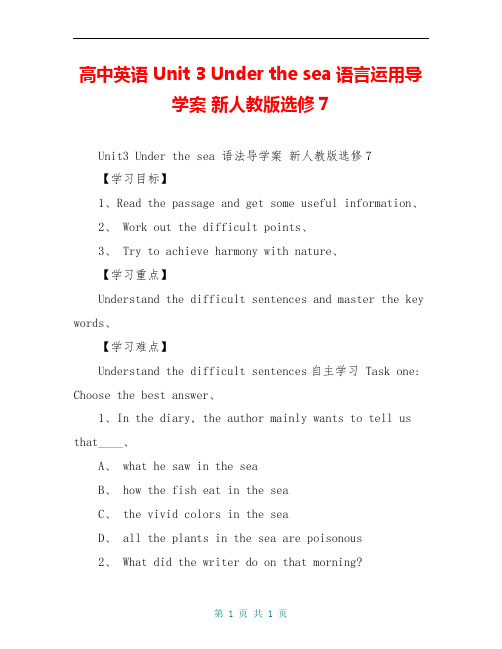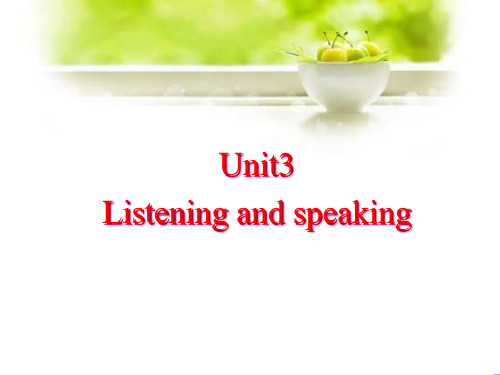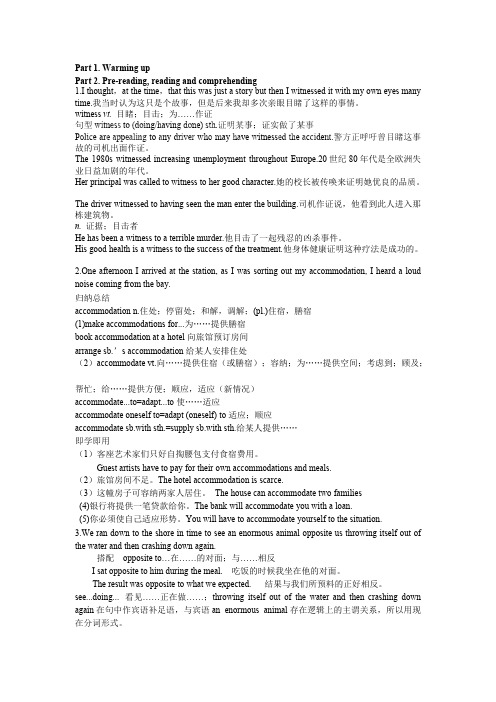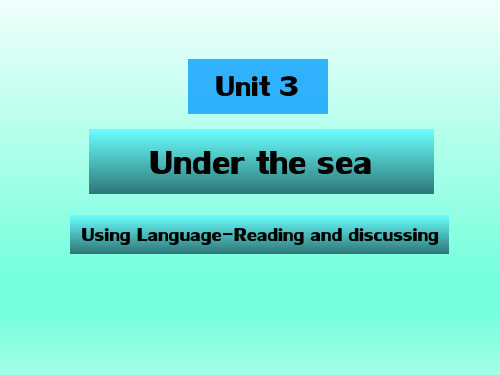人教版高中英语选修7 Unit3__Communication__and__writing参考教案
- 格式:doc
- 大小:37.00 KB
- 文档页数:6


高中英语 Unit 3 Under the sea 语言运用导学案新人教版选修7Unit3 Under the sea 语法导学案新人教版选修7【学习目标】1、Read the passage and get some useful information、2、 Work out the difficult points、3、 Try to achieve harmony with nature、【学习重点】Understand the difficult sentences and master the key words、【学习难点】Understand the difficult sentences自主学习 Task one: Choose the best answer、1、In the diary, the author mainly wants to tell us that____、A、 what he saw in the seaB、 how the fish eat in the seaC、 the vivid colors in the seaD、 all the plants in the sea are poisonous2、 What did the writer do on that morning?A、 Go swimmingB、 Go fishingC、 Go snorkelingD、 Go sailing3、Which kind of corals’ shape is NOT mentioned in the text?A、 PlatesB、 MushroomsC、 LaceD、 Bottle4、 H ow many kinds of creatures didn’t the author want to get too close to according to the fourth paragraph?A、 TwoB、 ThreeC、 FourD、 Five5、、From the whole text we can know that the writer felt that_______、A、 He was a tiny spot compared with the whole world、B、 The ocean was a tiny spot compared with the whole world、C、 There was no danger in the sea except the sharks、D、 All kinds of fish were waiting for something for food、Task two: Read the text and fill in the blanks、During the snorkeling trip, the writer first became _____ of the ____ colours and the fantastic corals、 He saw little fish ________ the bodies of larger fish, the parrotfish _________ upside down, sea-slug _______ by a sea-star, a turtle passing so close to him, an eel_______ its head from a hole, a clam _______ for something to swim in between its thick green lips、 He felt ______ to death on seeing some creatures、 It is a wonderful and _________________ world under the sea、Task three: Glance quickly through the text and number the paragraph topics in the correct order、 colors and shapes ________ the reef’s edge _________ dangers _________ a final thought ________ reflecting _________ some sea creatures _________合作探究1、reflect 映射,反射,思考(B级)教材原句__________________________________________________________________________________________________________________ _______reflect vi &vt vt、反射,反映 vi、反射,映出,思考归纳拓展:reflect on/upon sth be lost in reflectionThe still water reflected the full moon、恬静的水面映出一轮圆月。



Book7 Unit 3 Old Tom the Killer Whale 虎鲸老汤姆一、教学目标1. 知识目标:通过深层次的理解,使学生了解并掌握词汇用法,并完成有关课文内容的练习。
2. 能力目标:通过个人活动,同伴活动和小组活动,使学生掌握速读—略读—精读—总结—寻找细节等阅读文章的各种阅读技巧,并利用多媒体课件创设情境,为学生提供大量的输出机会,提高学生的听说读写能力及培养他们的发散思维与创新能力。
3. 情感目标:体验使用多媒体手段辅助学习的乐趣和成就感,帮助学生更多的了解海洋生物,培养学生热爱和保护海洋生物的意识。
二、教学重点与难点1. 培养学生的阅读策略及获取信息的方法。
2. 创设情境,激活学生思维,培养学生的合作学习能力以及发现问题,思考问题和解决问题的能力。
三、教学媒体选择多媒体教室、计算机、CAI课件四、教学设计思路《全日制义务教育普通高级中学英语课程标准(实验稿)》把基础教育阶段英语课程的目标设定为以学生语言知识、语言技能、情感态度、学习策略和文化意识的发展为基础,培养学生英语综合语言运用能力。
同时,也指出:“高中英语课程的设计与实施要有利于学生优化英语学习方式,是他们通过观察、体验、探索等积极主动的学习方式,充分发挥自己的学习潜能,形成有效的学习策略,提高自主学习的能力。
”应《标准》的要求,我将在培养学生听说读写四个能力的基础上通过对教学情境的创设,采用discussion等方式来进行对本单元的教学。
本单元是高中英语人教版选修七第三单元Under the Sea。
该单元的中心话题是“海底世界”,单元各项活动的设计都是围绕海底动植物、海底奇妙景观,以及有关大海的神话故事展开的。
本课时是根据该单元中的阅读内容“Old Tom the Killer Whale”而设计的一节课。
作者以第一人称的口吻,讲述了一个名叫Old Tom的虎鲸的故事。
学生阅读此文可以了解人类如何利用鲸捕杀鲸的残酷现实。

高二英语选修七unit3课文知识点Unit 3: Environmental Protection and Natural DisastersIn the second year of high school, students studying English as a second language are often required to study different units and texts. Unit 3 of the selected curriculum for Grade 10 English is focused on Environmental Protection and Natural Disasters. This unit aims to enhance students' understanding of environmental issues, promote eco-friendly attitudes, and equip them with relevant vocabulary and language skills. Let's explore some of the key knowledge points covered in this unit.1. Vocabulary and Expressions:Vocabulary plays a crucial role in language learning. In Unit 3, students encounter various terms related to environmental protection and natural disasters. Some key words and expressions include pollution, conservation, sustainability, deforestation, global warming, climate change, earthquake, volcanic eruption, hurricane, flood, and drought. Learning these words will enable students to describe and discuss environmental issues and natural disasters more effectively.2. Reading Comprehension:Unit 3 presents a series of reading passages to improve students' reading comprehension skills. The texts cover topics such as climate change, the impact of pollution on our ecosystem, and the aftermath of natural disasters. By reading these articles, students develop their ability to identify main ideas, understand supporting details, and make inferences. They also gain awareness of the importance of environmental protection in our daily lives.3. Listening and Speaking:Listening and speaking activities provided in this unit help improve students' oral communication skills. They are encouraged to listen to conversations, interviews, and speeches related to environmental issues. By engaging in discussions and debates, students develop their ability to express opinions, present arguments, and support claims with evidence. These activities promote critical thinking, active participation, and effective communication in English.4. Grammar and Language Functions:Unit 3 focuses on specific grammar structures and language functions related to the topic. Students are introduced to various sentence patterns, such as expressing opinions using modal verbs (e.g., "should," "must"), making conditional statements (e.g., "if...then"), and using reported speech to convey others' opinions. These grammarpoints enable students to communicate their thoughts and ideas accurately and appropriately.5. Writing Skills:The unit includes writing tasks that require students to compose essays, reports, or letters related to environmental protection and natural disasters. These writing activities aim to develop students' skills in organizing ideas, structuring paragraphs, and using appropriate vocabulary and grammar. By practicing different writing styles, students enhance their ability to express themselves effectively in written form.Overall, Unit 3 of the Grade 10 English curriculum provides students with a comprehensive understanding of environmental issues and natural disasters. Through vocabulary acquisition, reading comprehension, listening and speaking exercises, grammar practice, and writing tasks, students develop their language proficiency, critical thinking abilities, and awareness of the importance of environmental conservation. This unit equips students with the necessary skills to communicate confidently and effectively in English while discussing these crucial topics.。
年级高二学科英语版本人教新课标版课程标题选修7 Unit 3 Under the sea -words、phrases and language point编稿老师冯振宇一校林卉二校李秀卿审核刘晓军一、学习目标知识目标:学习本单元的单词、短语和句型。
能力目标:能够用这些单词、短语及句型进行语言表达,并能够解答与之相关的习题。
二、重点、难点1、重点:●重点单词annual, witness, pause, drag, urge, abandon, reflect, aware, scare●重点短语in the meantime, help…out, upside down, sort out, come on, ahead of, have on●重点句型1) As we drew closer, I could see a whale being attacked by a pack of about six other killers.2) “And those others are stopping it diving or fleeing out to sea,” George told me, pointingtowards the hunt.3) I’m sitting in the warm night air with a cold drink in my hand and reflecting on the day-aday of pure magic!4) The fish didn’t seem to mind me swimming among them.2、难点:with的复合结构及几组同义词的辨析三、知能提升(一)重点单词[单词学习]1. annual adj. 每年的;按年度计算的n. 年刊;年鉴annually adv. 年度地,每年地【用法】an annual income 年收入an annual report 年度报告【例句】Premier Wen Jiabao noted that the two most important problems would be previous to anything else in the government annual report.温家宝总理在政府年度报告中指出要优先解决这两大问题。
Unit 3 Under the seaPeriod 3 A sample lesson plan for Using Language(A New Dimension of life)IntroductionLanguage is learned to be used in and for communication. So in this period we shall have the students read, listen, write and speak in English, making use of the focused words, collocations, structures and topic ideas covered in this unit. Warming up by listening and reading aloud is to be followed by reading for forms, copying and making sentences, putting the text A New Dimension of Life into a short play, writing a paragraph and reading, discussing and listening about whale watching tours. The class will end in students speaking and writing.ObjectivesTo help students read the passage A New Dimension of lifeTo help students to use the language by reading, listening, speaking and writingProcedures1.Warming up by listening and reading aloudWhy do we read aloud? Because reading aloud:∙Is great fun, and it benefits our growth as readers and learners.∙Nurtures our love of both the written and spoken word.∙Gives us a chance to rediscover favorite stories and find new ones.Helps us develop important language skills that will help us learn to read on our own.So open your book to page 23 and read the text aloud while listening to the recording. Watch your pauses between the thought groups.2. Reading for formsRead the text again to: cut/ the sentence into thought groups, blacken the predicates, darken the connectives and underline all the useful collocations.3. Finding collocations and making sentencesThere are several different types of collocation made from combinations of verb, noun, adjective etc. Some of the most common types are: •Adverb + Adjective: completely satisfied (NOT downright satisfied) •Adjective + Noun: excruciating pain (NOT excruciating joy)•Noun + Noun: a surge of anger (NOT a rush of anger)•Noun + Verb: lions roar (NOT lions shout)•Verb + Noun: commit suicide (NOT undertake suicide)•Verb + Expression With Preposition: burst into tears (NOT blow up in tears)•Verb + Adverb: wave frantically (NOT wave feverishly)You are asked to read the text and find all the useful collocations and copy them into your Collocation Book after class as homework. You may make your own sentences with these collocations.4. Put the text A New Dimension of Life into a short playActing out the text is a strategy for motivating us to read out loud the text. We need oral practice and help with pronunciation and so acting out the text really helps us.A New Dimension of LifeAct OneIt’s 8:00am, a warm morning, at the side of the reef. The sea ripples abit and a man is preparing to go snorkeling on the reef.Jerry: Well, (looks at all his equipment) I’m ready now! (confidently) One, two, three…go! (jumps into t he sea)(Jerry sees all the vivid colors surrounding him-purples, reds, yellows, blues and greens and all kinds of corals shaped like fans, plates, brains, lace, mushrooms, the branches of trees and the horns of deer.)Jerry: (surprisingly) Wow…that’s fan tastic! (at the very time, a group of fish swims by and a fish stops and begins to talk with him)The fish: (elegantly) Hi, body! Where are you going?Jerry:(friendly) Hello, Mr. Fish, I’m just going around and trying to find something new to me.The fish: Oh, this is the right place. Good luck! (then goes away) (Jerry continues to swim, after a while, he sees a little thing. And then he goes close to it, trying to find what it is.)Jerry: (happily) Oh, another small cute fish! (then says friendly to it-a little orange and white fish) Morning, boy!Anemone fish: (frightened) Who are you?Jerry: Man.Anemone fish: What is man? I’ve never seen Man before!Jerry: Stuff like me is called Man. And who are you?Anemone fish:Anemone fish…(it seems extremely frigh tened, and slip away, hiding in the poisonous tentacles of the sea anemones)Jerry:(murmurs) … a coward fish, but anyway, fantastic! (then he sees another fish even more fantastic than the anemone fish…)(Jerry sees a small fish is cleaning the body of a large fish.)Jerry: (crying) Dangerous! Go away!Small fish:(smiling at him) Don’t worry! We are friends! (it then gets inside the mouth of the larger fish and begins to clean its teeth) Jerry:(opens his mouth widely) Wow, I’ve never thought of this! Jerry:I’d better go! That’s too scaring!(There are lots of strange creatures. By the way he swims, he sees a yellow and green parrotfish hanging upside down, gathering tiny plants off the coral with its hard bird-like mouth; a yellow-spotted red sea-slug sliding by a blue sea-star; an orange and blue-striped angelfish looking straight at him; a large wise-looking turtle passing so close to me that I could touched it. )Jerry: (says to himself) A wonderful underground world! When I come back, I will tell Marry.Act Two(A whole day’s traveling finishes, and Jerry goes back home, sitting in the warm night air with a cold drink in his hand, talking with his wife-Marry) Marry: … then what else did you see? (with her chin on her fist, seems really interested in Je rry’s experience)Jerry: …then I said goodbye to the friendly turtle and went swimming again, and I met other creatures that I didn’t want to get close to-an eel with its strong sharp teeth, with only its head showing from a hole, watching for a tasty fish, or my tasty toe; and the giant clam half buried in some coral waiting for something to swim in between its thick green lips. Then there are two gray reef sharks, you know, each about one and a half meters long, which suddenly appeared behind some coral.Marry: Oh, that’s too dangerous!Jerry: That’s the case, and I told myself they weren’t dangerous but that didn’t stop me from feeling scared to death for a moment! The water was quite shallow but where the reef ended, there was a sharp drop to the sandy ocean floor. I thought I was very brave when I swam over the edge of the reef and hung there looking down into depths of the ocean. My heart was beating wildly-I felt exposed in such deep clear water!Marry: …and it’s very interesting!Jerry: Oh, what a wonderful, limitless world it is down there! And what a tiny spot I am in this enormous world!(The end)5. Writing a paragraphLet’s read A New Dimension of life on page 23 again. Pay attention to the ways the author uses words and collocations to describe colors, patterns, shapes, and animals.Now you are to write a paragraph describing a place and the plants or animals there.The first stop on a visit to Zuoquan is the Mt. Miao’er Scenic Area, known as the National Geographical Park, featuring geological structure movements and hydraulic creations. The whole area is scattered with valleys, such as Chazuogou and Yaojiagou. Measuring 1,500 meters long and a dozen meters wide, Chazuogou has currents and deep pools, and is where a gorge, 700 meters high, forms a fantastic view. Walking along plank roads on precipitous cliffs, one can clearly see the traces of geographical transformation and the effect water erosion has had on the area over the years.Ganlanba (Olive Dam), a complex of several villages inhabited by the Dai people, is shaped like an olive and abounds in evergreen plants; hence its name. Viewed from the air, the villages are connected to one another and covered with green trees, while Buddhist pagodas and bamboo tower houses stand out amidst the lush green. Ganlanba is also known as Menghan ("han" means rolling up), and according to a legend, from which the name derives, when Sakyamuni came here to preach Buddhism, his followers laid a cotton cloth on the ground for him to tread on. After he had walked over it, his followers rolled up the cloth.I was shocked to see fish tanks (鱼缸) with so many live fish. Each did not have enough room to turn round and there were dead fish floating on the surface. I was horrified (惊骇的), but then I saw hundreds of crabs (螃蟹) in pots dying under the bright lights. But for a lifelong animal lover like me, the worst were the tanks of turtles, all destined (去往…的) to end up as soup.Iguanodon, or "iguana tooth" was a large plant eater who was 30 feet long and stood 6 feet tall when on his hind legs. This dinosaur from the Early Cretaceous period had large thumb spikes, thought to be used for defense or possibly to pull branches off trees. Iguanodon could walk on it's hind feet or on all fours and was a very good swimmer.6. Reading, discussing and listening about whale watching toursWhale watching as a commercial activity began in 1955 in North America along the southern California coast. Today, whale watching is carried on in the waters of some 40 countries, plus Antarctica. All the large whale species and many dolphins and porpoises canbe seen regularly on a wide range of tours,lasting from an hour to two weeks. Whale watching is a non-consumptive use of whales with economic, recreational, educational and scientific dimensions. The economic benefits occur in areas where whale watching has quickly become a significant aspect of a local tourism economy.Now you may turn to page 25. Read Whale Watching Tours, discuss the three questions, and then listen to the tape.Collocations from Whale Watching Toursmiss an opportunity to do…错过做……的一个机会, at close range接近地,在很近的范围/区域空间里, on one’s annual migration年度迁徙, on whale watching tour观光鲸鱼, sit outside for clear viewing坐在外面清晰地赏景, witness…in one’s natural environment在自然的环境中见证/亲眼目睹……, l eap out of…从……中跳出, success rate 成功率, offer…a free tour向……提供免费旅游, refund half the fare半价7. Closing down by speaking and writingFlying as an airline passenger is an often memorable experience, but there are times where the experience is memorable for all the wrong reasons: mechanical problems, poor service, bad food, lost luggage, or any of a number of other problems that result in a significant inconvenience or financial loss for the passenger. If you experience this kind of problem with your airline, you may want to deal with it by lodging a complaint with the airline or to one of the authorities that oversee air transportation.On page 27, at the top, there are some collocations. You are going to make up dialogues with them for the three situations.Understand Why You Are ComplainingAfter you have decided to gather information about your situation, butbefore you make that phone call or write that letter, you should take a bit of time and get to know a few basic things about your particular circumstances:●Why you are complaining●What situation caused you to complain and what people ororganizations played a role in that situation●What are the things that you want to happen that will address thecomplaint● What should you reasonably expect as an outcomeComplaining to the airline serviceYou: Hello, is this the Airline Service?Airline: Yes, speaking.You: I’m sorry but I have to complain to you about your bad service. Airline: What is it?You: I’d like to talk to the manager.Airline: I am the manager.You: I missed my flight to Beijing yesterday afternoon. I went to the airport early. I waited in the waiting room, but I didn’t hear the flight being announced over the loudspeaker.Airline: I’m afraid the loudspeaker went wrong at the time.You: I suffered a lot from your bad service. I ask for a free flight from you.Airline: I’m feeling sad about your experience. We’ll refund all of your fare. And we’ll offer you a free ticket. Is that ok?You: That’s good. But I hope you will repair the loudspeaker as soon aspossible.Complaining to the manager of the restaurantYou: Hey! Are you the manager of the restaurant?Manager: Yes, I am. What is it?You: Come and have a taste of this fish.Manager: I’m afraid it has gone bad.You: Why did you serve me such bad fish as this?Manager: I’m sorry but I have to tell you that you have been eating too slowly. You know it is hot at this time of the year here. You have to eat your fish quick enough.You: What are you speaking of? I like a refund from you! A full refund. Manager: We’ll refund half the money you paid.You: Then I’ll write to the newspapers complaining about it.Manager: Do whatever you like.You: You…Complaining to the manager of the tailorYou: Look, Mr. Tailor. The trousers you made for me are too short. Tailor: I’m afraid you have come to the wrong tailor’s shop. We don’t make such trousers at all.You: But my son says he had the trousers made here.Tailor: I see. That tailor’s shop has moved to the next door. Ours is here for only a week.You: Sorry. I shall go to the next door to complain to them.。
Unit3 Communication and writing参考教案
The Fifth Period
Teaching goals 教学目标
1. Target language 目标语言
a. 重点词汇和短语
pure magic, extraordinary beauty, fantastic thing, scared to death
b. 功能句式
That’s not good enough.
I’m sorry but ...
I’m afraid ...
I’m feeling (annoyed with / unhappy about / unsatisfied with ...).
I’m not feeling (happy about / satisfied with ...).
I’d like to talk to the manager.
I’d like a full refund.
That’s no good for me.
I’d like a refund, please.
2. Ability goals能力目标
Enable the Ss to describe a place and the plants or animals there with the target language.
Enable the Ss to make complaint using the expressions given.
3. Learning ability goals学能目标
Help the Ss learn how to write a description of a place and the plants or animals there with the target language.
Help the Ss learn how to make complaint with the target language.
Teaching important and difficult points教学重难点
Help the Ss to master the useful expressions and learn to use them to express blame and Complaint in certain situations.
Teaching methods教学方法
Discussing, guided writing and speaking.
Teaching aids教具准备
A projector and a computer.
Teaching procedures & ways教学过程与方式
Step Ⅰ Revision
T: Good morning / afternoon everyone!
Ss: Good morning / afternoon, Sir / Madam!
T: Yesterday, I asked you to work in groups to check the meanings of the expressions given on Page 24 and talk about the times you had feeling like these. Have you done that? Now who would like to tell about a time you had these feelings?
Then ask some Ss to tell about the times they had feelings like these.
Possible descriptions:
Sa: I had a day of pure magic last summer. My parents took me for a tour in Benxi, Liaoning Province. When we went into a cavern, we saw icicle-shaped stalactites (钟乳石) grotesque in shape, hanging from the roof of the cavern. When the stalactites were lighted by the colorful lights, they looked extraordinary beauty. Then we took a boat floating on the river, it was very dark. Our boat hit the rock of the bank now and then, making my heart beating wildly. The exploring tour was the most fantastic thing I have ever done.
Sb: You really had a magic day! When I went to the Great Wall, I also had a fantastic feeling. You see, when I was climbing a narrow iron ladder straight up to a high watchtower, I felt scared to death and my heart was beating wildly. But when I reached the top of the watchtower and looked out over the mountains, every cell in my body woke up. My mood was extraordinary good and it was like discovering a whole new dimension of life.
Sc: The time I spent at Shengya—the World under the Sea, an aquarium in Dalian, may be compared with yours. When I got into the aquarium under the sea, I felt like discovering a whole new dimension of life. A variety of beautiful fish and many other ocean animals, which I couldn’t call their names, were swimming around and the colorful sea plants were waving softly following the current of the sea. Seeing such extraordinary beauty in the world, I felt every cell in my body woke up. That was。